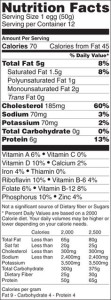Eggs and Cholesterol, Thumbs Up or Thumbs Down?
I find myself being asked repeatedly about eggs, “How many can I have, What if I have high cholesterol, Are egg whites better than whole eggs?” Especially with Easter around the corner, eggs are on the hot seat. So what’s the deal?
For the last few decades, doctors have cautioned Americans against eating eggs, or guiding them toward eating only egg whites when they do eat them. It was thought that their high cholesterol content would raise blood cholesterol and increase the risk of heart disease, among other things. However, these notions were based on fear rather than actual science. In fact, dietary cholesterol has relatively little to no effect on blood cholesterol. It is actually the trans fats, sugars and large amounts of processed foods that this culture consumes that causes high blood cholesterol levels. It is not the dietary cholesterol itself that is wreaking havoc.
Interestingly, in studies conducted on people who eat lots of eggs (2/day on average) in comparison with those who do not eat eggs or eat eggs whites only, the eggs eaters have a greater boost in HDL (“good”) cholesterol as well as increases in the size of both HDL and LDL particles (bigger is better), which was attributed, at least in part to the phospholipid compounds in eggs. Studies have also found no relationship between eggs (one or two a day) and heart disease or stroke.
Eggs are an excellent source of protein and also provide vitamins A and D, some B vitamins, zinc, iron and other beneficial substances, including choline and the carotenoids lutein and zeaxanthin. For most people, eating an egg or two a day, on average – or perhaps more – has no negative effects. In fact, it is likely to be very beneficial regardless of your blood cholesterol levels.
Egg Buying Guide: -The color of the eggshell correlates to the color of the chicken. Thus, brown is not better than white. -If you buy organic eggs remember they will not all be created equal, they will naturally be of different colors and sizes.LOVE FOR EGGS.


